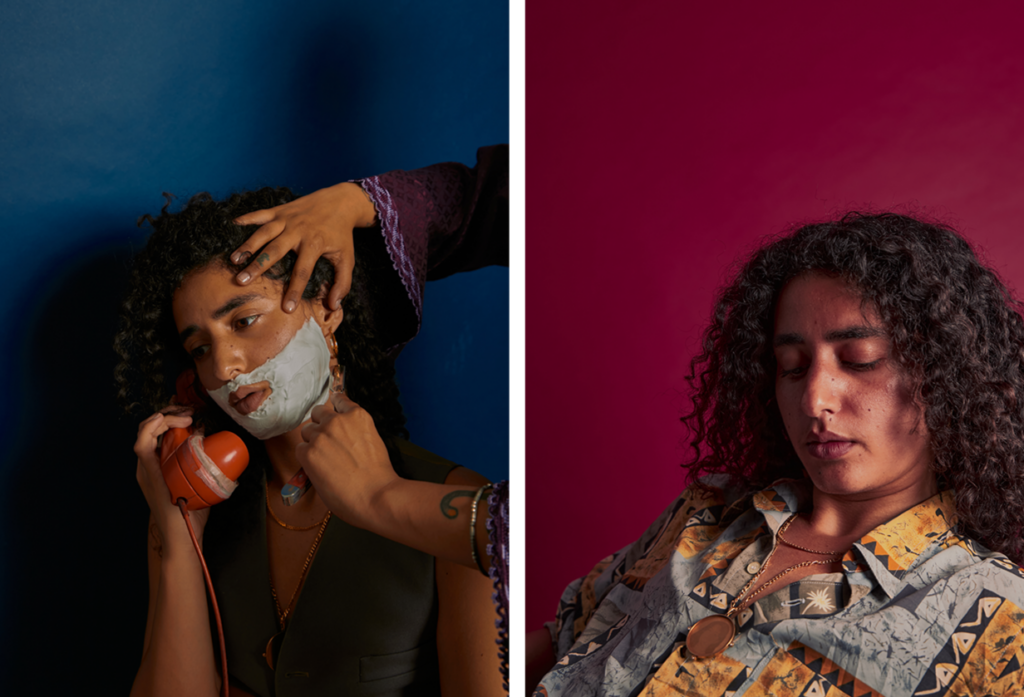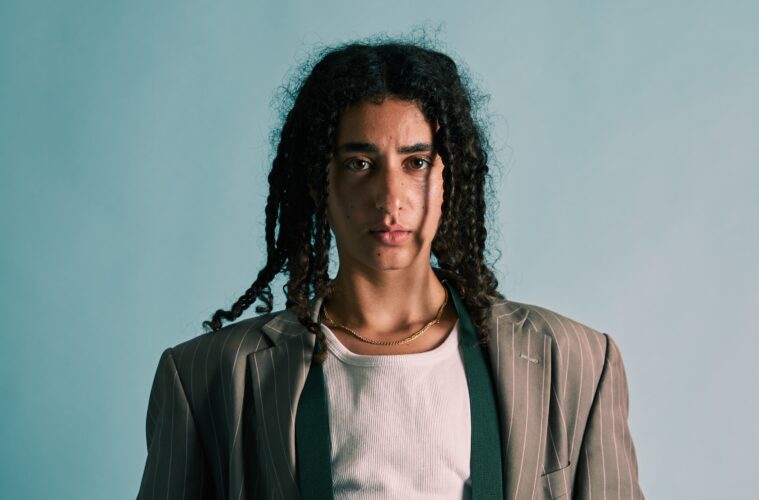Photography by Salam Zaied
Creative direction by Zee La Medina
Shot at Open Studio
New Vibes/اجواء جديدة gives a snapshot of emerging and established independent, experimental, and underground sound artists and projects in their own words <3
Kuwaiti singer-songwriter and multi-instrumentalist, Etaf, cultivates a genre-bending sound that integrates evocative Arabic vocals, melodies, and rhythms with fast street beats. Deviating from conventions, they write with a critical and political conscience: their music intends to impact and inspire. Read more to get learn more about Etaf: their background and approach, sound and philosophy, what they’re listening to now.
Find more of their work on IG, YouTube, Vevo, Spotify, and TikTok.
Tell us a bit about yourself…
I’m a singer-songwriter and a multi-instrumentalist originally from Kuwait, with Palestinian and Lebanese roots. Both my grandmothers are from the Levant. I create a genre-defying sound, and I really love being authentic to myself and my practice. I moved to the UK initially to do a Masters and PhD in Law (Yes, I’m a doctor in law, something many people don’t know).
Music is what I’ve wanted to do since I was eleven years old, and I am finally free and able to pursue what I love without fear. People tell me that I am kind of late to start music now, but I think I’m just in the right place and time. I spent the last 10 years reinventing myself, understanding and forming my identity, and battling for my personal freedom. When I am on stage, now, I know exactly who I am and why I am singing, I know my values and principles, and I am so unapologetic about it.
How do you describe your sound?
In the same way that you describe my name. Etaf means many things, but one of the meanings is deviation (en3e6af). I deviate from conventions, all kinds of conventions. I like to be original and authentic in my expression. My music identity is innovative and daring.

Photography by Salam Zaied
I refuse to be confined by traditional genre structures; I am the genre. I write and sing in Arabic and English, and integrate rich, evocative Arabic melodies, vocals, and rhythms with fast street beats. My songs are stories that are deeply personal but universally relatable. I write with a critical and political conscience. My music intends to have an impact, inspire, and empower people to live free and happy, and resist all forms of oppression. As Arab, that is not easy, and we all know that we have to fight so much for our freedom and liberation as a community.
Can you tell us about your latest project, and what you’re looking forward to?
They say it takes just one person to believe in you, and for me, I have a whole community – that is what keeps me going. I learned so much about community, care, and support in my latest project “Small Details”, a single accompanied by a sexy music video that is now available on Vevo and YouTube. I achieved what I wanted with a painfully small budget from my own pocket, and with an all female team. I want to prove that music is not only for the rich (and it shouldn’t be), and that we don’t need the toxic power of men to get us out there as AFAB artists.
My philosophy is to resist, and I’m not ashamed or scared to say that I’m angry at the system.
I wrote “Small Details” four months ago at a spa in Richmond. The way I make music is that I erupt, I never know when words and music will come out. It’s the first song in which I rap in Arabic, an approach I’m currently exploring. I met my cool producer Eve Singleton when I first performed the song at AWAN Festival in Rich Mix, and we have so much more to share with the world in the near future.
“Small Details” is powerful and empowering, and also really vulnerable. It articulates my struggles about my story growing up under a system that wants to control my body, movement, self-expression, independence, and my heart. My philosophy is to resist, and I’m not ashamed or scared to say that I’m angry at the system. I am not scared to say that I am angry at the system. I am tired of oppression and limitation around my gender expression, freedom, and liberation as an Arab. I’m done with being told “don’t do that”, “don’t wear that”, “3eib”… “Inti bint”…etc. These struggles are “small” in the sense that they are unnoticed, but they are actually so big, impactful, and harmful. The project pushes boundaries and resists through love, pleasure, and hope. It isn’t “hating on men”; I hate patriarchy, sexism, and misogyny.
What is one of your tracks that you connect with the most, at the moment? Can you tell us more about it?
I wrote “Taboot” for my grandmother Etaf, who is from Gaza. I saw her pain and trauma in a way that I’ve never experienced before during my first trip to Kuwait after the genocide started. Since the 7th of October, we’ave lost over 60 relatives.
Taboot means coffin, and this is how I describe my grandmother’s home, Gaza: a big coffin with dead bodies. The song talks about my grandmother’s sadness, despair, and, rhetorically, her refusal to cook. In the song, I ask, “how can she cook without an olive tree?” Although I have achieved some personal freedom, I don’t think I will ever be fully free until Palestine is.
Who are you listening to these days?
I have been listening and exploring so many Palestinian artists and music, old and new. I listen to Maysa Daw, especially their song “Enough,” which I have performed several times in London in fundraisers for Palestine. I also recently discovered Haya Zaatry, and their recent song “Sarab,” which they did with Tayar – it’s beautiful and important. I also listen to Sabreen’s “Ramallah 1989” every morning; my heart melts and hearts at the same time when Kamilya Jubran says in the song “Edi fe jaiby, ya badakhin, ya basafir, min kotr elqahar”. Retweet.

